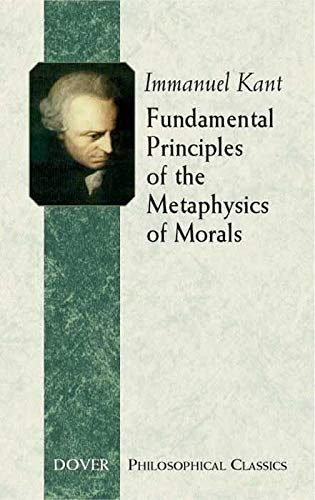Synopsis
What is morally permissible, and what is morally obligatory? These questions form the core of a vast amount of philosophical reasoning. In his Fundamental Principles of the Metaphysics of Morals, Immanuel Kant developed a basis for the answers.
In this landmark work, the German philosopher asks what sort of maxim might function as a guide to appropriate action under a given set of circumstances. By universalizing such a maxim, would morally permissible behavior not become clear? Suppose that everyone were to behave in accordance with this maxim. If everyone followed the maxim in the same way without harm to civilized culture, then the behavior would be morally permissible. But what if no one followed the maxim? Would civilization thereby be at risk? In such a case, the behavior would be morally obligatory.
Kant's test, known as the Categorical Imperative, is a logical proof of the Golden Rule and the centerpiece of this work. It constitutes his best-known contribution to ethical discussion, and a familiarity with his reasoning in this book is essential to students of philosophy, religion, and history.
Biographie de l'auteur
IMMANUEL KANT, born in Königsberg, East Prussia (in what is now Kaliningrad, Russia), on April 22, 1724, was reared by parents who were members of the Lutheran sect known as Pietists. Though his upbringing was religious, Kant did not find himself subjected to a dogmatic or doctrinaire home environment. After completing his early education at the Collegium Fridericianum, he entered the University of Königsberg in 1740 at the age of sixteen. Though it was originally thought that he would make the ministry his life’s pursuit, Kant took the minimum number of required courses in theology and then dedicated himself to philosophy, mathematics, and physical science. During the years between 1746 and 1755 he worked as a private tutor in an effort to support himself through graduate work after the death of his parents left him without financial assistance. Receiving his doctorate in 1755, he taught at the University of Königsberg for fifteen years until 1770 when he was finally promoted to Professor of Logic and Metaphysics. Kant held this position until his death on February 12, 1804.
Among Kant’s most important philosophical works are: The Critique of Pure Reason (1781), Prolegomena to Any Future Metaphysics (1783), Idea for a Universal History (1784), Fundamental Principles of the Metaphysic of Morals (1785), Metaphysical Foundations of Natural Science (1786), Critique of Practical Reason (1787), Critique of Judgment (1790), Religion within the Limits of Reason Alone (1793), Perpetual Peace (1795), Metaphysics of Ethics (1797), and Anthropology from a Pragmatic Point of View (1798).
Les informations fournies dans la section « A propos du livre » peuvent faire référence à une autre édition de ce titre.
